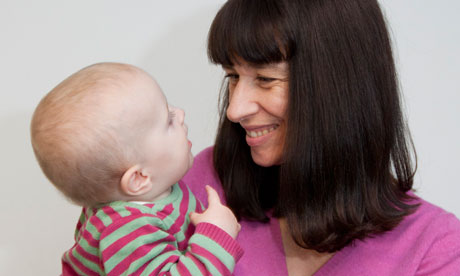
Friday evening in a busy west London maternity hospital and I'm being wheeled briskly into theatre for my emergency caesarean. There is a sense of urgency, a situation growing more grave by the minute. Paediatricians hover and doctors consult. "Does the baby need in-utero resuscitation?" I hear someone ask. Should I have a general anaesthetic or an epidural; how much time do we have? My husband is whisked away to dress for theatre. I feel strangely calm, relieved to be in the hands of doctors duly concerned about my labour, away from the midwives who seemed anything but during the past seven hours in their care.
The anaesthetist administers an epidural. "Three minutes," the surgeon tells him, his eyes fixed on the heart monitor showing my baby's distress.
At six minutes past midnight, Amelia is born. The radio in the theatre is playing Waterloo Sunset, but apart from that there is no sound. The hearty scream I took for granted with my first two children is startlingly absent. As is the sight of a lusty pink baby that latches on within seconds. If I don't hear a cry in the next few seconds my world will collapse. I hear the faintest mewl. "Is she all right? Is she breathing?" I call, twisting my head in their direction, the rest of my body numb.
Ten minutes later I see her for the first time; she is perfect, but worryingly pale and sleepy. A paediatrician explains that Amelia was born not breathing but with a reassuringly strong heart-rate. They don't need to admit her to the neo-natal unit but want to supervise her closely for 24 hours. The rest of the night passes in a blur of paediatricians monitoring her blood sugar levels, temperature and heart rate. How could it have come to this?
Rewind to an over-stretched maternity ward several hours earlier. "You probably won't give birth until tonight," one midwife told me. "The labour ward's full anyway." And that's where my nightmare began. I'd been induced that morning and sent home; when I returned I was taken to a waiting area. By late afternoon my contractions were increasing, yet none of the midwives seemed interested. "They're so strong now," I told one. "Count them then, they should be every two minutes." She barely looked up.
More time passed before I was wired up to a heart monitor known as a CTG – cardiotocogram – to check the unborn baby's heart rate for signs of fetal distress. "Isn't it trying to tell us there's something wrong?" we asked a midwife who was passing when it beeped at regular intervals. She laughed and told us how to turn it off should it beep again.
Still no one checked my progress. My midwife seemed mildly surprised when I told her that I'd been induced. The contractions were frequent now, and still the monitor kept beeping. Finally my husband collared our midwife, hoping to get an idea of when I might go to the labour ward. Surely something should be done? She looked vague but said she would examine me. "Those contractions look pretty strong but you're hardly dilated." She stared at the monitor, baffled. "Maybe I'll call the doctor." Soon afterwards I was moved to theatre.
Later I discovered that I had shown signs of hyperstimulation, due to my induction, which can affect the baby's heart rate. I still can't help thinking about the "what ifs". What if my husband hadn't demanded some action? If another hour had passed without them checking me? There are no clear answers, even from Cathy Warwick, chief executive of the Royal College of Midwives, when I tell her about my case. "One of the things we're trying to do is to create systems where more than one person looks at the trace [of the CTG scan]. It is a very inexact science and so a lot of places are introducing double-checks, every hour. There's a real appreciation that we've got to up our game in terms of CTG training."
I have since read that around 500 babies a year are thought to die because of this problem, and an unknown number of others suffer brain damage.
The next morning, a doctor told me that had Amelia been delivered much later, we'd be looking at "a very different outcome". As it was, all of Amelia's tests were clear; I was discharged a day later with a healthy baby.
Eight years ago, at the same hospital, the midwifery care I had was excellent and the standard of medical expertise there still is. Yet my experiences with midwives was startlingly different. Was it a case of bad luck? Partly, I suspect, combined with broader issues such as a national shortage of midwives, a funding crisis and soaring birthrates.
I complained to the hospital who took my case extremely seriously and the midwives' behaviour was investigated. When I met them, the clinicians said that, according to my midwife, she had beeped a doctor around an hour before that final examination, but there was no response. The hospital has stressed the importance of not muting alarms or asking patients and relatives to do so. They agreed that "the option of transferring earlier to the delivery suite to be monitored could have been discussed and put into place sooner". My midwife also apologised for the "quality of care before Amelia was born".
Almost a year later I feel profoundly fortunate to have a healthy baby, but I still shudder when I think how different things could have been.

